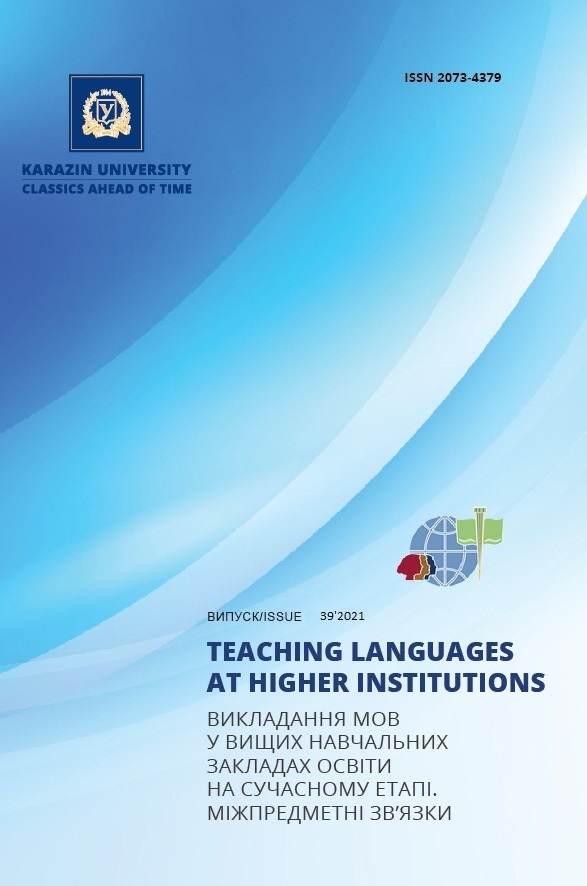Criteria for the Selection of Speech Material for Teaching English for Specific Purposes to Public Administrators
Abstract
Currently, the priority of postgraduate education is the preparation of specialists with a sufficient level of knowledge of a foreign language for the successful exchange of both scientific and technical achievements through inter-lingual channels. Foreign language competence is a prerequisite for professional development of a specialist, and knowledge of a professionally oriented foreign language as a means of intercultural communication will allow a prospective specialist to build the basis of their personal and social life with practical skills and abilities and implement them in professional activities. This allows us to highlight the importance and necessity of a foreign language competence development in the sphere of public administration. Competence development process should be based on authentic materials and account for situations of real-life professional interaction of the specialists that leads to the relevance of the study, which aims to define the criteria of selection of the speech material for teaching English for specific purposes. This aim led to the use of theoretical research methods (studying philosophical, linguistic, psychological, didactic and methodological papers to understand the problem, developing theoretical foundations and conceptual approaches to the development of program material) and empirical ones (scientific observation of teaching a professionally oriented foreign language to public administrators). The article also outlines the importance of the development of professionally-oriented foreign language competence for the public administrators, highlights the main requirements for the candidates for public service positions in the European space, and discovers educational processes in the framework of postgraduate education in Ukraine. The authors define the unit of selection of teaching material and describe the procedure of its selection as well as the conditions of the development of foreign language competence for professional purposes.
Downloads
References
Azimov, E.G., Shchukin, A.N. (1999). Slovar metodycheskykh termynov (teoryia y praktyka prepodavanyia yazykov) [Dictionary of Methodology Terms (theory and practice of teaching languages)]. Saint Petersburg: “Zlatoust” [in Russian].
Aleksandrov, A.S. (2003). Vvedeniye v sudebnuyu lingvistiku [Introduction to forensic linguistics]. Nizhny Novgorod: Nizhnenovgorodska pravovaya akademiya [in Russian].
Andriyenko, A.S. (2007). Razvitiye inoyazychnoy professionalnoy kommunikativnoy kompetentnosti studentov tekhnicheskogo vuza (na osnove kreditno-modulnoy tekhnologii obucheniya) [Development of foreign language professional communicative competence of technical university students]. Extended abstract of candidate’s thesis. Rostov-on-Don [in Russian].
Bondar, L.V. (2011). Metodyka navchannia frantsuzkoho profesiino spriamovanoho monolohichnoho movlennia studentiv tekhnichnykh spetsialnostei z urakhuvanniam yikh navchalnykh styliv [Methods of teaching French professionally oriented monologue speech to students of technical specialties, taking into account their learning styles]. Kyiv [in Ukrainian]
Borisko, N.F. (1999). Kontseptsiya uchebno-metodicheskogo kompleksa dlya prakticheskoy yazykovoy podgotovki uchiteley nemetskogo yazyka (na materiale intensivnogo obucheniya) [The concept of an educational and methodological complex for the practical language training of teachers of the German language (based on the material of intensive training)]. Kyiv: Izdatelskyi tsentr KGLU [in Russian].
Verevkina-Rakhalskaya, Yu.N. (2007). Metodika ispolzovaniya Internet-resursov v formirovanii kommunikativnoy kompetentsii studentov spetsializirovannykh vuzov na materiale obshchestvenno-politicheskoy tematiki: 2-oy kurs. angliyskiy yazyk [The method of using Internet resources in the formation of the communicative competence of students of specialized universities on the material of socio-political topics (English, second year)]. Сandidate’s thesis. Moscow [in Russian].
Voropayeva, N.F. (1981). Otbor i organizatsiya tekstov dlya chteniya: (angliyskiy yazyk. neyazykovoy vuz) [Selection and organization of reading texts: (English, non-linguistic university)]. Сandidate’s thesis. Khabarovsk [in Russian].
Datskiv, O.P. (2011). Metodyka formuvannia vmin hovorinnia u maibutnikh uchyteliv anhliiskoi movy zasobamy dramatyzatsii [Methods of forming speaking skills in future English teachers by means of dramatization]. Сandidate’s thesis. Kyiv [in Ukrainian]
Dyvnych, H.A. (2017). English-language competence of civil servants: European experience. State and regions. Series: Public Management and Administration, 3 (59), pp. 49–54 [in Ukrainian].
Koreiba, I.V. (2010). Metodyka navchannia profesiinoho chytannia maibutnikh uchyteliv nimetskoi movy z vykorystanniam Internet-resursiv [Methods of teaching professional reading to future German language teachers using Internet resources]. Сandidate’s thesis. Kyiv [in Ukrainian].
Koriakovtseva, N.F. (2010). Teoriia obucheniia ynostrannym yazykam: produktyvnyie obrazovatelnyie tekhnolohii [Theory of teaching foreign languages: productive educational technologies]. Moscow: Yzdatelskyi tsentr “Akademyia” [in Russian].
Bihych, O.B., Borysko, N.F., Boretska H.E. et al. (2013). Metodyka navchannia inozemnykh mov i kultur: teoriia i praktyka [Methods of teaching foreign languages and culture: theory and practice]. Nikolaieva, S.Yu. (ed.). Kyiv: Lenvit [in Ukrainian].
Pankratova, E.A. (2004). Formirovaniye pravovoy kartiny mira u studentov yuridicheskikh spetsialnostey sredstvami inostrannogo yazyka (Na materiale angliyskogo yazyka) [Formation of the legal picture of the world among students of legal specialties by means of a foreign language (Based on the material of the English language)]. Сandidate’s thesis. Nizhny Novgorod [in Russian].
Passov, E.I. (1983). Teoreticheskiye osnovy obucheniya inoyazychnomu govoreniyu [Theoretical foundations of teaching speaking in a foreign language]. Voronezh: Izdatelstvo Voronezhskogo universiteta [in Russian]
Bakaieva, H.Ye. et al. (2005). Prohrama z anhliiskoi movy dlia profesiinoho spilkuvannia [A program for English for specific purposes]. Kyiv: Lenvit [in Ukrainian].
Simkova, I.O. (2010). Metodyka navchannia anhlomovnoi profesiino oriientovanoi dyskusii studentiv inzhenernykh spetsialnostei [Methods of teaching English-speaking professionally oriented discussion to engineering students]. Сandidate’s thesis. Kyiv [in Ukrainian].
Slobin, D. Grin Dzh. and Leontyev, A. (2003). Psycholinguistics. 2nd edition. Moscow [in Russian].
Sysoyev, P.V. and Evstigneyev, M.N. (2010). Metodika obucheniya inostrannomu yazyku s ispolzovaniyem novykh informatsionno-kommunikatsionnykh Internet-tekhnologiy: uchebno-metodicheskoye posobiye dlya uchiteley, aspirantov i studentov [Methodology of teaching a foreign language using new information and communication Internet technologies: a manual for teachers, postgaduate and graduate students]. Rostov-on-Don: Feniks; Moscow: Glossa-Press [in Russian].
Chirva, I.V. (2008). Metodyka navchannia maibutnikh inzheneriv-prohramistiv anhliiskoho dialohichnoho movlennia z vykorystanniam kompiuternykh prohram [Methods of teaching English dialogic speech to prospective engineers-programmers using computer programs]. Сandidate’s thesis. Kyiv [in Ukrainian].
European Convention of Human Rights. (1950). European Court of Human Rights. Council of Europe, p. 55 [in English].
Thornbury, S. (2005). How to Teach Speaking. Essex: Pearson Education Limited, p. 156 [in English].

